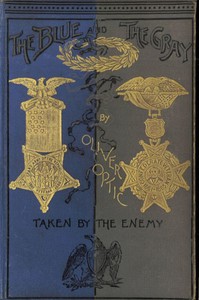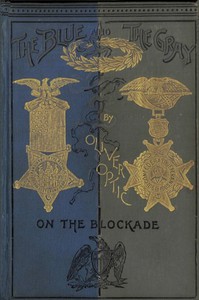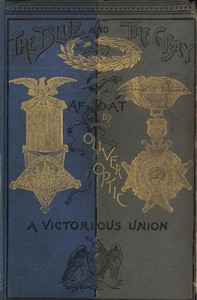Taken by the Enemy, the Enemy by Oliver Optic [the beach read TXT] 📗

- Author: the Enemy by Oliver Optic
Book online «Taken by the Enemy, the Enemy by Oliver Optic [the beach read TXT] 📗». Author the Enemy by Oliver Optic
28 Certainly if the Northern brother had anticipated that a terrible war was impending, he would not have permitted his daughter Florence, a beautiful young lady of seventeen, to reside during the winter in a hot-bed of secession and disunion. The papers informed him what had been done at the North and at the South to initiate the war; and the thought that Florry was now in the midst of the enemies of her country was agonizing to him.
Though he felt that his country demanded his best energies, and though he was ready and willing to give himself and his son to her in her hour of need, he felt that his first duty was to his own family, within reasonable limits; and his earliest thoughts were directed to the safety of his daughter, and then to the welfare of his brother and his family.
"War!" exclaimed Mrs. Passford, when her husband had announced so briefly the situation which had caused such intense agitation in his soul. "What do you mean by war, Horatio?"
"I mean all that terrible word can convey of destruction and death, and, worse yet, of hate and revenge between brothers of the same household!" 29 replied the husband impressively. "Both the North and the South are sounding the notes of preparation. Men are gathering by thousands on both sides, soon to meet on fields which must be drenched in the gore of brothers."
"But don't you think the trouble will be settled in some way, Horatio?" asked the anxious wife and mother; and her thoughts, like those of her husband, reverted to the loving daughter then in the enemy's camp.
"I do not think so; that is impossible now. I did not believe that war was possible: now I do not believe it will be over till one side or the other shall be exhausted," replied Captain Passford, wiping from his brow the perspiration which the intensity of his emotion produced. "A civil war is the most bitter and terrible of all wars."
"I cannot understand it," added the lady.
"Is it really war, sir?" asked Christy, who had been an interested listener to all that had been said.
"It is really war, my son," replied the father earnestly. "It will be a war which cannot be carried to a conclusion by hirelings; but father, 30 son, and brother must take part in it, against father, son, and brother."
"It is terrible to think of," added Mrs. Passford with something like a shudder, though she was a strong-minded woman in the highest sense of the words.
Captain Passford then proceeded to inform his wife and son in regard to all the events which had transpired since he had received his latest papers at Bermuda. They listened with the most intense interest, and the trio were as solemn as though they had met to consider the dangerous illness of the absent member of the family.
The owner did not look upon the impending war as a sort of frolic, as did many of the people at the North and the South, and he could not regard it as a trivial conflict which would be ended in a few weeks or a few months. To him it was the most terrible reality which his imagination could picture; and more clearly than many eminent statesmen, he foresaw that it would be a long and fierce encounter.
"From what you say, Horatio, I judge that the South is already arming for the conflict," said Mrs. Passford, after she had heard her 31 husband's account of what had occurred on shore.
"The South has been preparing for war for months, and the North began to make serious preparation for coming events as soon as Fort Sumter fell. Doubtless the South is better prepared for the event to-day than the North, though the greater population and vast resources of the latter will soon make up for lost time," replied the captain.
"And Florry is right in the midst of the gathering armies of the South," added the fond mother, wiping a tear from her eyes.
"She is; and, unless something is done at once to restore her to her home, she may have to remain in the enemy's country for months, if not for years," answered the father, with a slight trembling of the lips.
"But what can be done?" asked the mother anxiously.
"The answer to that question has agitated me more than any thing else which has come to my mind for years, for I cannot endure the thought of leaving her even a single month at any point which is as likely as any other to become a 32 battle-field in a few days or a few weeks," continued Captain Passford, with some return of the agitation which had before shaken him so terribly.
"Of course your brother Homer will take care of her," said the terrified mother, as she gazed earnestly into the expressive face of the stout-hearted man before her.
"Certainly he will do all for Florry that he would do for his own children, but he may not long be able to save his own family from the horrors of war."
"Do you think she will be in any actual danger, Horatio?"
"I have no doubt she will be as safe at Glenfield, if the conflict were raging there, as she would be at Bonnydale under the same circumstances. From the nature of the case, the burden of the fighting, the havoc and desolation, will be within the Southern States, and few, if any, of the battle-fields will be on Northern soil, or at least as far north as our home."
"From what I have seen of the people near the residence of your brother, they are neither brutes nor savages," added the lady.
33 "No more than the people of the North; but war rouses the brute nature of most men, and there will be brutes and savages on both sides, from the very nature of the case."
"In his recent letters, I mean those that came before we sailed from home, Homer did not seem to take part with either side in the political conflict; and in those which came to us at the Azores and Bermuda, he did not say a single word to indicate whether he is a secessionist, or in favor of the Union. Do you know how he stands, Horatio?"
"My means of knowing are the same as yours, and I can be no wiser than you are on this point, though I have my opinion," replied Captain Passford.
"What is your opinion?"
"That he is as truly a Union man as I am."
"I am glad that he is."
"I do not say that he is a Union man; but judging from his silence, and what I know of him, I think he is. And it is as much a part of my desire and intention to bring him and his family out of the enemy's country as it is to recover Florry."
34 "Then we shall have them all at Bonnydale this summer?" suggested Mrs. Passford. "Nothing could suit me better."
"Though I am fully persuaded in my own mind that Homer will be true to his country in this emergency, I may be mistaken. He has lived for many years at the South, and has been identified with the institutions of that locality, as I have been with those of the North. Though we both love the land of our fathers on the other side of the ocean, we have both been strongly American. As he always believed in the whole country as a unit, I shall expect him to be more than willing to stand by his country as it was, and as it should be."
"I hope you will find him so, but I am grievously sorry that Florry is not with us."
"Tug-boat alongside, Captain Passford," said the commander.
The owner of the Bellevite wished the tug to wait his orders.
35 CHAPTER III DANGEROUS AND SOMEWHAT IRREGULARIn various parts of the deck of the Bellevite, the officers, seamen, engineers, and coal-passers of the steamer were gathered in knots, evidently discussing the situation; for the news brought on board by the pilot had been spread through the ship.
Captain Passford hardly noticed the announcement made to him by the commander, that the tug was alongside, for he was not yet ready to make use of it. Even the wife and the son of the owner wondered what the mission of the little vessel was to be; but the husband and father had not yet disclosed his purpose in coming to anchor almost in sight of his own mansion.
"Why have you come to anchor here, Horatio?" asked Mrs. Passford, taking advantage of the momentary pause in the interesting, and even 36 exciting, conversation, to put this leading question.
"I was about to tell you. I have already adopted my plan to recover Florry, and bring my brother and his family out of the enemy's country," replied the owner, looking with some solicitude into the face of his wife, as though he anticipated some objection to his plan.
"You have adopted it so quick?" inquired the lady. "You have not had much time to think of it."
"I have had all the time I need to enable me to reach the decision to rescue my child from peril, and save my brother and his family from privation and trouble in the enemy's country. But I have only decided what to do, and I have yet to mature the details of the scheme."
"I hope you are not going into any danger," added the wife anxiously.
"Danger!" exclaimed Captain Passford, straightening up his manly form. "War with all its perils and hardships is before us. Am I a villain, a poltroon, who will desert his country in the hour of her greatest need? I do not so understand myself."
37 "Of course I meant any needless exposure," added Mrs. Passford, impressed by the patriotic bearing of her husband.
"You may be assured, Julia, that I will incur no needless peril, and I think I am even more careful than the average of men. But, when I have a duty to perform, I feel that I ought to do it without regard to the danger which may surround it."
"I know you well enough to understand that, Horatio," said the lady.
"I believe there will be danger in my undertaking, though to what extent I am unable to say."
"But you do not tell me how you intend to recover Florry."
"I intend to go for her and my brother's family in the Bellevite."
"In the Bellevite!" exclaimed the lady.
"Of course; there is no other possible way to reach Glenfield," which was the name that Homer Passford had given to his plantation.
"But Fort Morgan, at the entrance of Mobile Bay, is in the hands of the Confederates, and has been for three or four months," said Christy, 38 who had kept himself as thoroughly posted in regard to events at home as the sources of information would permit.
"I am well aware of it; and I have no doubt, that, by this time, the fort is strongly garrisoned, to say nothing of other forts which have probably been built in the vicinity," replied Captain Passford.
"It says in this paper that the ports of the South have been blockaded," said Christy, glancing at the journal in his hand.
"The President has issued a proclamation to this effect, but there has hardly been time to enforce it to any great extent yet. But of these matters I have nothing to say yet. The important point now is that I shall go in the Bellevite to Mobile Bay, and by force or strategy I shall bring off my daughter and the family of my brother."
"Then I suppose Christy and I are to be sent on shore in the tug alongside," suggested Mrs. Passford.
"That is precisely what I wanted the tug for," added the husband.
"I should be willing to go with you, and share 39 whatever dangers you may incur," said the lady, who had by this time come to a full realization of what war meant.
"I should be a heathen to allow you to do so. A woman would be more of a burden than a help to us. You had better return to Bonnydale, Julia, where I am sure you can render more service to your country than you could on board of the steamer. All that I am, all that I have, shall be at the service of the Union; and I wish you to act for me according to your own good judgment."
"I shall do whatever you





Comments (0)